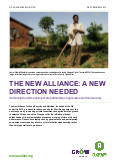 The New Alliance for Food Security and Nutrition, launched at the G8 summit in 2012, promises to reduce poverty for 50 million people over the next ten years by increasing private investment and agriculture-led growth in selected African countries. One year after the initiative’s launch, evidence provided by a new Oxfam Briefing note about its implementation presents a worrying picture of its performance so far.
The New Alliance for Food Security and Nutrition, launched at the G8 summit in 2012, promises to reduce poverty for 50 million people over the next ten years by increasing private investment and agriculture-led growth in selected African countries. One year after the initiative’s launch, evidence provided by a new Oxfam Briefing note about its implementation presents a worrying picture of its performance so far.
26 September, 2013 | Oxfam
Oxfam Briefing Note
The new Alliance: A new Direction is needed
In a recently launched statement Oxfam asks for a different approach of the New Alliance for Food Security and Nutrition.
The past decade has witnessed a resurgence of interest in investing in agriculture. In 2003, heads of state from across Africa committed to allocate at least 10 per cent of their national budgets on an annual basis to agriculture and, through their commitment to the Comprehensive Africa Agriculture Development Programme (CAADP), to reduce poverty through agriculture-led growth. [1] More recently, at the 2009 G8 Summit in L‟Aquila, Italy, world leaders responded to the global spike in food prices by pledging to provide $22bn over three years to promote food security in developing countries. [2]
Amidst tight budgets and austerity measures, donors and developing countries are increasingly turning to the private sector. Public–private partnerships (PPPs), aimed at leveraging the resources of private investment to achieve development objectives, represent an emerging trend in this direction. The New Alliance for Food Security and Nutrition, launched at the 2012 G8 Summit is one such example. To understand better how the New Alliance is being implemented, Oxfam conducted fact-finding research in several of the early adopting countries (specifically Ghana, Tanzania, and Mozambique [3]).
Private investment in the agriculture sector of developing countries, especially investment made by small-scale producers themselves, is critical to driving inclusive growth. However as Oxfam documents, there are good reasons to be sceptical that large-scale private investment, even in well-intentioned PPPs, can benefit small-scale producers.
Initiatives such as the New Alliance failed so far to work with stakeholders to develop and execute investments that are rooted in a shared vision for development and built on partnerships not just with companies and governments, but also with small-scale producer organizations (POs), civil society, and local communities themselves.
For New Alliance leadership (host and donor governments) and companies in each country, Oxfam recommends to strengthen the role of POs and civil society groups, including those representing women, the rural poor, and consumers. Moreover they ask for environmental and social impact assessments as prerequisites to any company investment activity to identify and mitigate activities with potentially harmful consequences. In general they demand better transparency of the initiative by increasing available information at both the global and local levels.
[1] AU Maputo Declaration on Agriculture and Food Security in Africa. http://www.nepad.org/nepad/knowledge/doc/1787/maputo-declaration
[2] “L‟Aquila” Joint Statement on Global Food Security: L‟Aquila Food Security Initiative (AFSI). http://www.mofa.go.jp/policy/economy/summit/2009/statement3-2.pdf. Of the $22bn pledged at L‟Aquila, only $6.8bn was new or additional to existing funding levels.
[3] To gather information for this report, country research was carried out in Ghana, Mozambique, and Tanzania. Additional information was gathered from Oxfam staff in Ethiopia. The full list of early adopting countries is Burkina Faso, Côte d‟Ivoire, Ethiopia, Ghana, Mozambique, and Tanzania.kfh
